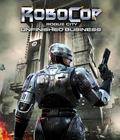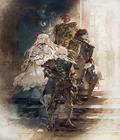The DioField Chronicle is a strategy-RPG from Square Enix that has been released in the same year as the similarly weirdly named Triangle Strategy. Both games are about dealing with the politics in a semi-magic world where three nations are battling over precious resources. There's a lot to invite comparisons between the two. Unfortunately, that reflects poorly on The DioField Chronicle. Almost everything Triangle Strategy does right, DioField does wrong, and the result is a game that isn't very fun to play.
The DioField Chronicle is set on the island nation of DioField. The land is rich in a magical resource called jade, which can be harnessed by users of Ancient Sorcery to unleash powerful spells. Unfortunately for DioField, they are not the only ones who use jade. A nearby empire is attempting to invade all the lands, and an alliance of nations stands against them. Both nations have their eyes set on DioField's rare resources, and a battle over the country begins, while DioField itself is plagued by scheming and internal political backbiting. Players are given command of the Blue Fox, a ragtag group of mercenaries who are sent to solve the problems nobody else can. Led by the enigmatic Andrias and his closest friend Fredret, the Blue Foxes find themselves in the middle of the bloodiest conflicts DioField has ever known, and they must find a way to emerge alive.
There is a lot of darkness and moral ambiguity in DioField, and it's genuinely neat to see a protagonist who is basically the opposite of a good person. Those interesting ideas are buried under a tsunami of forgettable faceless characters and dull-as-dishwater politics. Several major characters in the game don't even have portraits, and many important characters die "off-screen" and are reported via narration.
Perhaps the biggest problem is that DioField is set up for a far more interesting sequel that we may or may not get. A few late-game plot twists effectively render pointless everything you've spent the rest of the game doing. The ending is insanely brief and serves a shock stinger to set up a future game. Most of the characters get no resolution at all, and while a game that sets up a sequel isn't inherently bad, DioField doesn't earn it and leaves you feeling unsatisfied.
DioField is largely built around its combat system, which is effectively an RTS-style JRPG combat system instead of a turn-based one. You have a team of four characters to take into battle, and all combat takes place in real time. You order your units around, and time pauses while you issue commands, but by and large, this is far closer to something like WarCraft III's hero units than any sort of Triangle Strategy.
In theory, positioning is quite important to the game. If you can draw in enemies so their back is facing your party, you'll do significantly greater damage to your hapless foes, but the same rules apply to your own party. Several characters have taunts that force enemies to attack only them, which encourages you to find the best positions to inflict maximum damage.
Characters come in one of four classes: fighter, mage, rider and ranged. The exact specifics of what characters can do depends on their weapons. For example, ranged is divided into guns and bows. Every bow-wielding character shares the same basic skill set, but available skills depend on the equipped weapon. There are generally two "trees" for each class, usually focusing either on damage versus support or single-target versus AoE.
You can use the abilities of your class at any time, but they cost EP. Once you use a skill, all of your skills go on cooldown, with the length of the cooldown depending on the skill. A healing spell might have a short cooldown, while a high-damage fire spell might have a longer one. Each character can also bring an adjunct into battle, who also gives access to the skills of their class. For example, you can have a defensive sword-and-shield tank who can heal or a single-target melee fighter who can use the AoE attacks of a gunman.
In addition, you also gain TP while fighting foes. TP fills up a gauge that you can use to summon, Final Fantasy-style. Since the summons include Bahamut and a Final Fantasy-style Coeurl, this is what they're intended to be. Summons are very powerful and can deal out a ton of damage or offer party-wide support or buffs. More powerful summons require more of the gauge, which means you need to decide if you'd rather use Bahamut three times or Oroborus once.
However, everything that I've mentioned above is entirely unnecessary to finish the game. With the combat system, players only need to stack high-damage/low-cooldown attacks to defeat everything effortlessly. Andrias gets enough cooldown to spam his attacks over and over again, while the enemy is literally helpless to respond. In theory, his limited amount of EP should be a concern, but EP-recovery potions are cheap, and the second summons replenishes most of the EP. Even if you don't use him, the same basic rules apply to the very few stages when he isn't available: Stack damage bonuses, and enemies will melt.
This makes the combat in DioField painfully boring once you get past the earliest section. Sure, you can try to set up complex strategies and draw enemies to attack their weak points, but it is less effective than sending all four of your party members into the midst of the enemy to spam skills and possibly taunt, if you're feeling spicy. By the endgame, the only reason Rias wasn't soloing the entire map is because my gun user with the absurdly powerful Headshot skill could clear entire groups of enemies before they moved.
It doesn't help that there is basically no enemy variety. The bulk of foes you'll face function exactly the same every single time. Bosses are the same as mooks, except they have multiple health bars and hit a bit harder. Even the final boss follows this rule. Magical beast enemies are close to interesting, but there are only a handful of them, and in the case of several late-game foes like the Skeletal Dragon or Oroborus, they literally died before I could see any of their attacks.
It isn't one specific skill that sours things but the realization that the game provides way more EP than you could possibly need. Sure, it's fun to effortlessly destroy entire armies for a short while, but you achieve your endgame power long before the endgame. Nothing changes from start to finish, except getting one or two skills that are more powerful.
Alas, this means there isn't much to The DioField Chronicle. The game has some interesting story beats, but they're buried by dull politics that never quite manage to land because it's all setup for a sequel anyway, and the combat system is broken to the point of being unenjoyable. A single playthrough might be enjoyable — but not at full price. It's easy to picture players getting bored long before they see the ending.
DioField isn't much on the eyes, either. The graphics are simplistic and basic, and early on, you'll quickly see the limited variety of enemies, attacks and environments. The character art is nice, and to the game's credit, most of the units stand out rather distinctively, but that's about all it has going for it. Thankfully, the music and voice acting are better. Indeed, the voice acting goes a long way toward carrying the plot, with several characters shining more than they otherwise might thanks to strong performances.
The DioField Chronicle is interesting as an experiment, but that's about all it has going for it. The combat system is so half-baked that it may as well not exist, and the story is about 20 hours of buildup for a "buy the sequel" hook. Since the phenomenal Triangle Strategy came out in the same year, and it handles pretty much all the same ideas much better, it's difficult to recommend DioField. Even if you're curious, it's best to wait for a sale because the full retail price is too steep for what you'll get.
Score: 6.0/10
More articles about The DioField Chronicle











 The DioField Chronicle is an all-new strategy/RPG that immerses players in an epic tale of war and honor
The DioField Chronicle is an all-new strategy/RPG that immerses players in an epic tale of war and honor




















